|
|
|
Sort Order |
|
|
|
Items / Page
|
|
|
|
|
|
|
| Srl | Item |
| 1 |
ID:
120061
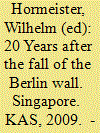

|
|
|
|
|
| Publication |
Singapore, KAS, 2009.
|
| Description |
147p.Pbk
|
| Series |
Panorama Insights into South East Asian and European Affairs
|
|
|
|
|
|
|
|
|
|
|
|
Copies: C:1/I:0,R:0,Q:0
Circulation
| Accession# | Call# | Current Location | Status | Policy | Location |
| 057218 | 943.087/HOR 057218 | Main | On Shelf | General | |
|
|
|
|
| 2 |
ID:
142884
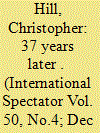

|
|
|
|
|
| Summary/Abstract |
In the early Spring of 2015 the United Kingdom lost two of its best experts on European integration – John Pinder and Roger Morgan. Both brought academic expertise and great practical judgement to their support for the European project from a starting-point which stressed the importance of persuading the nation states of the benefits of increased integration. As we approach a referendum on Britain’s continued membership – a strange and unnecessary affair for most of those without a political axe to grind – their voices will be greatly missed, not least as the new generation of EU experts in British universities is increasingly cosmopolitan in character. The debate over BREXIT in the UK requires informed indigenous voices if it is not to be overtaken by raucous extremism, but they are ever fewer in number.
|
|
|
|
|
|
|
|
|
|
|
|
|
|
|
|
| 3 |
ID:
077575
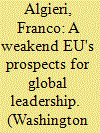

|
|
|
|
|
| Publication |
2007.
|
| Summary/Abstract |
After France and the Netherlands rejected the EU Constitution, the European integration project has reached a crucial stage. Even though the EU is still a world champion in trade policy and development aid, it is in danger of becoming an irrelevant power.
|
|
|
|
|
|
|
|
|
|
|
|
|
|
|
|
| 4 |
ID:
073663
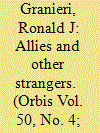

|
|
|
|
|
| Publication |
2006.
|
| Summary/Abstract |
Current tensions between the United States and Europe have raised questions about the future of the transatlantic relationship, though historical analysis suggests that the good old days were not perfect either. This article considers the history of U.S.-European relations and concludes that they have always been complex, as neither Americans nor Europeans have been sure how an integrated Europe would fit into an Atlantic partnership. It concludes that the future of the West depends on Europeans' developing on their own a clearer vision of the concrete shape and international role of the EU.
|
|
|
|
|
|
|
|
|
|
|
|
|
|
|
|
| 5 |
ID:
134074
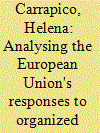

|
|
|
|
|
| Publication |
2014.
|
| Summary/Abstract |
In the past 30 years, organized crime (OC) has shifted from being an issue of little, or no concern, to being considered one of the key security threats facing the European Union (EU), the economic and political fabric of its society and its citizens. The purpose of this article is to understand how OC has come to be understood as one of the major security threats in the EU, by applying different lenses of Securitization Theory (ST). More specifically, the research question guiding this article is whether applying different ST approaches can lead us to draw differing conclusions as to whether OC has been successfully securitized in the EU. Building on the recent literature that argues that this theoretical framework has branched out into different approaches, this article wishes to contrast two alternative views of how a security problem comes into being, in order to verify whether different approaches can lead to diverging conclusions regarding the same phenomenon. The purpose of this exercise is to contribute to the further development of ST by pointing out that the choice in approach bears direct consequences on reaching a conclusion regarding the successful character of a securitization process. Starting from a reflection on ST, the article proceeds with applying a "linguistic approach" to the case study, which it then contrasts with a "sociological approach". The article proposes that although the application of a "linguistic approach" seems to indicate that OC has become securitized in the EU, it also overlooks a number of elements, which the "sociological approach" renders visible and which lead us to refute the initial conclusion.
|
|
|
|
|
|
|
|
|
|
|
|
|
|
|
|
| 6 |
ID:
101138
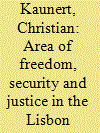

|
|
|
|
|
| Publication |
2010.
|
| Summary/Abstract |
Scholars may rightly claim the European Union's (EU) area of freedom, security and justice (AFSJ) has become one of the most significant developments in the European integration process. The Lisbon Treaty (LT) has the potential to push the AFSJ towards tremendous growth, and has provided the policy area with instruments that were unthinkable after the third pillar was created during the Maastricht Treaty negotiations. This article investigates the role of the European Commission in the process of constructing an 'AFSJ'. It argues that the Commission (through alliances with other institutional actors) managed to incrementally contribute to this shift in political norms. This shift derived from the policy-making level from 1999 onwards. It manifested itself specifically during the negotiations of the Constitutional Treaty (CT) and the subsequent re-negotiation of the LT. Here, the Commission acted with the support and the use of other supranational actors during the Convention, without which this result would have been difficult, if not impossible, to obtain. Firstly, the article will deal with the main advances of the CT which resulted in the LT. Subsequently, the role of the Commission and other EU institutional actors will be examined, resulting in an overall evaluation.
|
|
|
|
|
|
|
|
|
|
|
|
|
|
|
|
| 7 |
ID:
130897
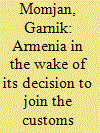

|
|
|
|
|
| Publication |
2014.
|
| Summary/Abstract |
I will speak about the situation in Armenia. On September 3, 2013 at the meeting with President Putin in Moscow, our President Serzh Sargsyan announced that Armenia would join the custom union. This statement echoed all over the world : in the evening, all leading information agencies and the media - BBC, Euronews and the Wall Street Journal were discussing it; they concluded that Russia had put pressure on Armenia.
|
|
|
|
|
|
|
|
|
|
|
|
|
|
|
|
| 8 |
ID:
159682
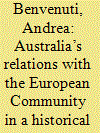

|
|
|
|
|
| Summary/Abstract |
In 2015, Australia and the European Union successfully negotiated a Framework Agreement. This agreement is an essential step in establishing a stronger Australia–European Union partnership and achieving closer bilateral cooperation. For years, negotiating such an agreement had proved impossible. In the 1970s, successive Australian governments showed interest in enhanced collaboration with the European Community, but the political climate for closer relations was far from encouraging. This article explains why this was the case. In doing so, it also explores how the Whitlam and Fraser governments envisaged, framed and developed Australia’s ties with the European Community in the 1970s, and asks whether a more positive approach on their part could have led to a stronger relationship. Based on recently declassified government files, this article shows that although both Whitlam and Fraser fully grasped the importance of the European Community as an emerging international actor and were willing to deepen Australia’s ties with it, significant constraints existed against enhanced bilateral cooperation. With the Common Agricultural Policy still a considerable challenge to Australian economic interests and with the European Community focused mainly on the management of its internal market, broader political considerations were inevitably relegated to the margins of Australia–European Community consultations.
|
|
|
|
|
|
|
|
|
|
|
|
|
|
|
|
| 9 |
ID:
029817
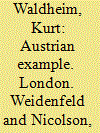

|
|
|
|
|
| Publication |
London, WeidenFeld and Nicolson, 1973.
|
| Description |
230p.Hbk
|
| Standard Number |
0297765221
|
|
|
|
|
|
|
|
|
|
|
|
Copies: C:1/I:0,R:0,Q:0
Circulation
| Accession# | Call# | Current Location | Status | Policy | Location |
| 011972 | 943.60523/WAL 011972 | Main | On Shelf | General | |
|
|
|
|
| 10 |
ID:
085400
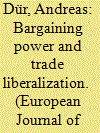

|
|
|
|
|
| Publication |
2008.
|
| Summary/Abstract |
Shortly after the creation of the European Economic Community (EEC, 1958), European countries accepted a far-reaching liberalization of their previously fairly protectionist external trade relations. I provide an explanation of this astonishing development that builds on the argument that the establishment of a customs union increases the bargaining power of its member countries in international trade negotiations. When facing discrimination from a customs union, exporters in excluded countries have an incentive to become politically active and lobby their governments for relief. This increase in exporter lobbying, in turn, weakens the negotiating position of excluded countries in international trade negotiations by making them more eager to achieve a negotiated agreement that lowers the external barriers of the customs union.
|
|
|
|
|
|
|
|
|
|
|
|
|
|
|
|
| 11 |
ID:
112080
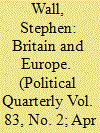

|
|
|
|
|
| Publication |
2012.
|
| Summary/Abstract |
Britain decided to join the European Community because its postwar, postimperial policies had failed and successive Governments saw no viable alternative. After ten years of being denied entry by De Gaulle, Britain joined on disadvantageous terms and with the British political parties, and the British people, deeply divided. Accession did not resolve the underlying issues and Britain's first year of membership saw an unprecedented oil crisis, bad relations between Britain and the United States and the demise of the British government led by Edward Heath. The underlying issues which had not been resolved in the accession negotiations were reopened by Harold Wilson and later by Margaret Thatcher. Some of them remain unresolved in British politics to this day.
|
|
|
|
|
|
|
|
|
|
|
|
|
|
|
|
| 12 |
ID:
059135
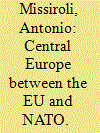

|
|
|
|
|
| Publication |
2004.
|
| Description |
p121-136
|
|
|
|
|
|
|
|
|
|
|
|
|
|
|
|
| 13 |
ID:
178801
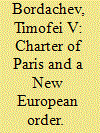

|
|
|
|
|
| Summary/Abstract |
The end of the Cold War opened up new vistas for building a new
international order in Europe, free of dividing lines. The more so since
the liberal world order, which emerged due to the evolution of the global
order in the field of security, on the one hand, and the rules, norms, and
practices established within the community of Western countries in 1945-
1991, on the other hand, was formally the most successful combination of
the effects of such categories as the balance of power and international
institutions. At the global level, this combination for a long time made
it possible to avoid revolutionary situations that might have been
caused by utter dissatisfaction of one or several major powers with their
position. However, in Europe, where the institutional basis of international interaction was most developed, the rules of the liberal world order
brought about significant distortions in favor of one of the participants
in this interaction—the European Union, which acted as an instrument for
increasing individual capabilities of major Western European countries.
This happened because the factor of military capabilities was excluded
from the overall balance of power of the main actors. Since for a long time
after the end of the Cold War Russia was limited in all factors of power
except for the military one, its position in relations with the EU was weak,
which is why its interests and values were ignored in building an EU-led
European order. This eventually paralyzed the entire system of multilateral
interaction in Europe, which, along with the shift of the global center of
power competition towards Asia, considerably marginalized the European
space in global affairs.
|
|
|
|
|
|
|
|
|
|
|
|
|
|
|
|
| 14 |
ID:
139619
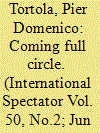

|
|
|
|
|
| Summary/Abstract |
Europe’s woes mark a new chapter in the longstanding theory/history nexus in European studies. The euro crisis has brought integration theory back onto the scholarly agenda and highlighted the value of neo-functionalism – and more precisely its key ‘spillover’ mechanism – as a framework for interpreting current politico-institutional dynamics in the European Union. We are, however, at a particular point of the neo-functionalist narration, in which the transition from low to high political integration has opened a phase of political fluidity that makes ideas and political leadership crucial in determining the future course of integration. In this phase, the positive scheme of neo-functionalism and the normative one of federalism come together, bringing the intellectual trajectory begun after WWII to full circle. Whether this new encounter will result in further integration depends primarily on the content of new federalist ideas, the emergence of an effective European leadership, and the presence of a favourable international environment. For all three factors, the record so far has been mixed at best.
|
|
|
|
|
|
|
|
|
|
|
|
|
|
|
|
| 15 |
ID:
086993
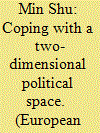

|
|
|
|
|
| Publication |
2009.
|
| Summary/Abstract |
European Union referendums invite national electorates to vote on transnational cooperation and regional integration, thereby creating tension between transnational ballot issues and domestic electoral mobilisation. Because of the tension, domestic political parties are forced to confront a two-dimensional political space in EU referendums. In the referendum-generated political space, unless integration issues are more salient than domestic concerns, intra-divided and inter-converged mainstream parties tend strategically to abstain from the campaigns. Yet, explicit inter-party collusion may allow the pro-integration mainstream to form a party cartel in EU referendums. Suggestive evidence is drawn from a case study of the two Irish referendums on the Nice Treaty. Based on a party-candidate survey, Irish parties are mapped onto a latent two-dimensional political space. The findings shed new light on the initial abstention of Irish mainstream parties in the first Nice campaign and their subsequent mobilisation in the second referendum.
|
|
|
|
|
|
|
|
|
|
|
|
|
|
|
|
| 16 |
ID:
123726
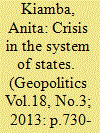

|
|
|
|
|
| Publication |
2013.
|
| Summary/Abstract |
This commentary responds to the essay Trapped in the Logic of the Modern State System? European Integration in the Wake of the Financial Crisis by Alex Murphy. The essay discusses the perseverance of the modern state system in an integrated Europe in the midst of the ongoing financial crisis. Murphy's essay raises a number of important observations and lessons for regions seeking to use the European Union model of integration. To this extent he submits that the essay is about engaging with the monetary experiences in Europe and the financial crisis experienced by the European Union since 2009. Murphy's essay provides its audience with the rationale behind the creation of the European monetary union, the structural challenges associated with the Union and the nationalist sentiments of its members amid deeper integration. The essay also provides its readers with lessons about integration and its challenges. In summary, the essay argues that the European Union has not achieved the desired level of integration because of a number of constraints, including the financial crisis which affirms that nationalist sentiments continue to exist even within a supranational institution like the European Union. Murphy's argument is that considerable attention has been specifically directed to the European Monetary Union at the expense of other integration projects. Indeed, as the financial crisis persists, its member states are becoming more fixated on their national interests. He observes that there are member states who have called on the economically weaker states like Greece to leave the Union. The essay concludes by recommending a shift in focus towards transnational networks and functional arrangements of integration rather than monetary and fiscal initiatives. The European Union provides us with an appropriate case study.
|
|
|
|
|
|
|
|
|
|
|
|
|
|
|
|
| 17 |
ID:
130891
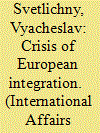

|
|
|
|
|
| Publication |
2014.
|
| Summary/Abstract |
Conferences organized by the journal in Yalta have already become a good tradition. It will be needless to speak of the significance that the Crimean land has for us: historically, ethnically, and mentally. Crimea is always a special place for Russia. There is no other area outside of Russia where so many Russian people live - Russian not only by ethnic origin, not only by blood, but also by spirit and mentality. We often
hear that Ukraine is going its own way, in accordance with its national interests. Of course, the choice of way is the right of every sovereign state. But many keep wondering about this. For example, at a recent meeting with local political analysts, the Chairman of the Council of Ministers of the Autonomous Republic of Crimea, Anatoly Mogilev, put the following question to the audience: "Will the signing of
the document in Vilnius become an irritating factor for Crimean society and lead to a destabilization of the situation?" The question is how to avoid de stabilization because nobody, whether in Moscow or in Kiev or especially in Crimea, is interested in it. No prediction of public behavior in this situation is yet available and we are looking forward to recommendations from the expert community.
|
|
|
|
|
|
|
|
|
|
|
|
|
|
|
|
| 18 |
ID:
130892
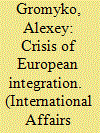

|
|
|
|
|
| Publication |
2014.
|
| Summary/Abstract |
Today, multipolarity and polycentrism are quantitatively and qualitatively different from their "prototypes" of historical periods of the past. Here it is necessary to single out three moments. First, Euro-centrism has been fading away in the past 20 years. Up to the 20th century, all the "concerts of powers" were based on the leading role of European states in international relations. Secondly, this new polycentrism is moving away from the straightforward dominance of the principle of force. The third moment, which characterizes the new-style multipolarity, is a phenomenon of international law that we have inherited from the 20th century.
|
|
|
|
|
|
|
|
|
|
|
|
|
|
|
|
| 19 |
ID:
130893
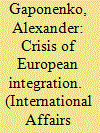

|
|
|
|
|
| Publication |
2014.
|
| Summary/Abstract |
AFTER THE USSR'S COLLAPSE, the Baltic states came under the political influence of the US and the economic influence of the European Union. This influence was used by their new geopolitical "curators" to initiate an anti-Russian line in both the foreign and domestic policies of Latvia, Lithuania and Estonia, as well as to break their economic ties with Russia. At present, the only significant economic ties that Russia still has with the Baltic countries are in the energy sector. It's the supply of natural gas through the pipeline and distribution systems with the use of the Incukalns underground storage facility. It's also the supply of Russian electricity and rail deliveries of hydrocarbons via the Ventspils and Klaipeda ports.
|
|
|
|
|
|
|
|
|
|
|
|
|
|
|
|
| 20 |
ID:
109314
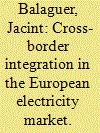

|
|
|
|
|
| Publication |
2011.
|
| Summary/Abstract |
This paper examines the electricity market integration process in two European areas based on the pricing behavior of Norwegian and Swiss exporters. The aim is to gain evidence for the period after the adoption of the "Second Legislative Package" (2003). The pricing behavior of Norwegian exporters indicates that the wholesale markets for Denmark and Sweden are highly integrated. Moreover, results are fully compatible with the existence of a very competitive marketplace for electricity. This clearly contrasts with the evidence provided by Swiss exporters. In this last case, analysis revealed differences in pricing-to-market behavior between Italy, France and Germany, which indicates that exporters take advantage of international market segmentation and divergences between market structures. This outcome provides a reasonable explanation as to why price differences between countries cannot be fully attributed to transmission costs, as has been claimed in previous research. We also found cross-country convergence in levels of markups and in pricing-to-market behavior of the Swiss exporters for the first part of the period that was analyzed. The evidence is fully consistent with an initial impulse toward market integration originated by reforms implemented at the beginning of the last decade.
|
|
|
|
|
|
|
|
|
|
|
|
|
|
|
|
|
|
|
|
|